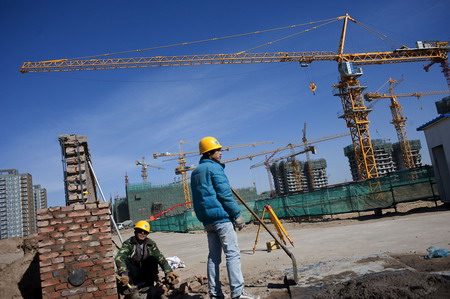Companies
Developers consolidate amid tightening
By Hu Yuanyuan (China Daily)
Updated: 2011-06-02 09:41
 |
Large Medium Small |
|
 |
|
Construction workers at the site of China Vanke Co's "Fun City" apartment complex on the outskirts of Beijing. [Photo / Bloomberg] |
32 M&As were completed between January and March, a record high
BEIJING - The number and value of mergers and acquisitions (M&A) in China's real estate sector reached a record high in the first quarter of 2011, amid the government's continuous tightening policies to tame inflation and sky-rocketing housing prices.
A total of 32 M&As were completed between January and March this year, a record high, said China Index Academy, a real estate research institute based in Beijing, in a report on Wednesday.
Twenty-two of those deals had a total value of $1.15 billion, which is nearly half of the total value of last year. The total number of deals also exceeded figures from previous years.
"With the government's rigorous property measures set to continue, there will be further consolidation in the industry this year," said Zhang Qiufang, head of research at China Index Academy.
There were 90 M&As in the property sector last year, among which China Vanke Co Ltd, the country's largest property developer, swallowed 24 companies.
According to Zero2IPO, more than 100 M&As are likely to take place in the real estate sector this year, which could mark a record high.
|
||||
The report showed that the average share value of Shanghai- and Shenzhen-listed property developers jumped from 7.3 billion yuan ($1.1 billion) at the end of 2010 to 8 billion yuan in the first quarter of this year.
Meanwhile, the cash flow for each share from the operations of these listed property developers has been lower than in 2008, the year when the global financial crisis struck.
"Given such a situation, adjusting the expansion speed and exploring channels for steady financing are key for listed companies to prevent high financial risks," said Zhang.
According to the report, the asset-liability ratio of Shanghai- and Shenzhen-listed property developers stood at 63.19 percent at the end of 2010, two percentage points higher than in 2009.
Over the same period, its Hong Kong-listed peers recorded an asset-liability ratio of 66.3, four percentage points higher than 2009.
Despite the increasing risks for listed property developers, some analysts are upbeat about the performance of property stocks.
"I believe property stocks will perform better than other industries in the second half of the year, because the government's tightening monetary cycle will probably end," said Nicole Wong, regional head of property research at CLSA Asia-Pacific Markets.
The index tracking property stocks on the benchmark Shanghai Composite Index has gained 9.7 percent so far this year, easily outperforming the index's 2.3 percent average increase.
On May 4, China Citic Bank Corp, the seventh-largest Chinese lender by assets, warned of severe risks in China's real estate market this year and said it plans to cut lending to the sector in a sign that banks could start to feel the effect of government efforts to cool the property market.
The government has repeatedly stressed the importance of continuing with its property-tightening policies, such as limiting home purchases and raising downpayment requirements.
According to the China Index Academy, 76 cities of the 100 it monitors this year saw property prices rise month-on-month in May from April. An average 0.53 percent rise in prices was recorded for the 100 cities in May, compared with 0.4 in April.
| 分享按鈕 |



